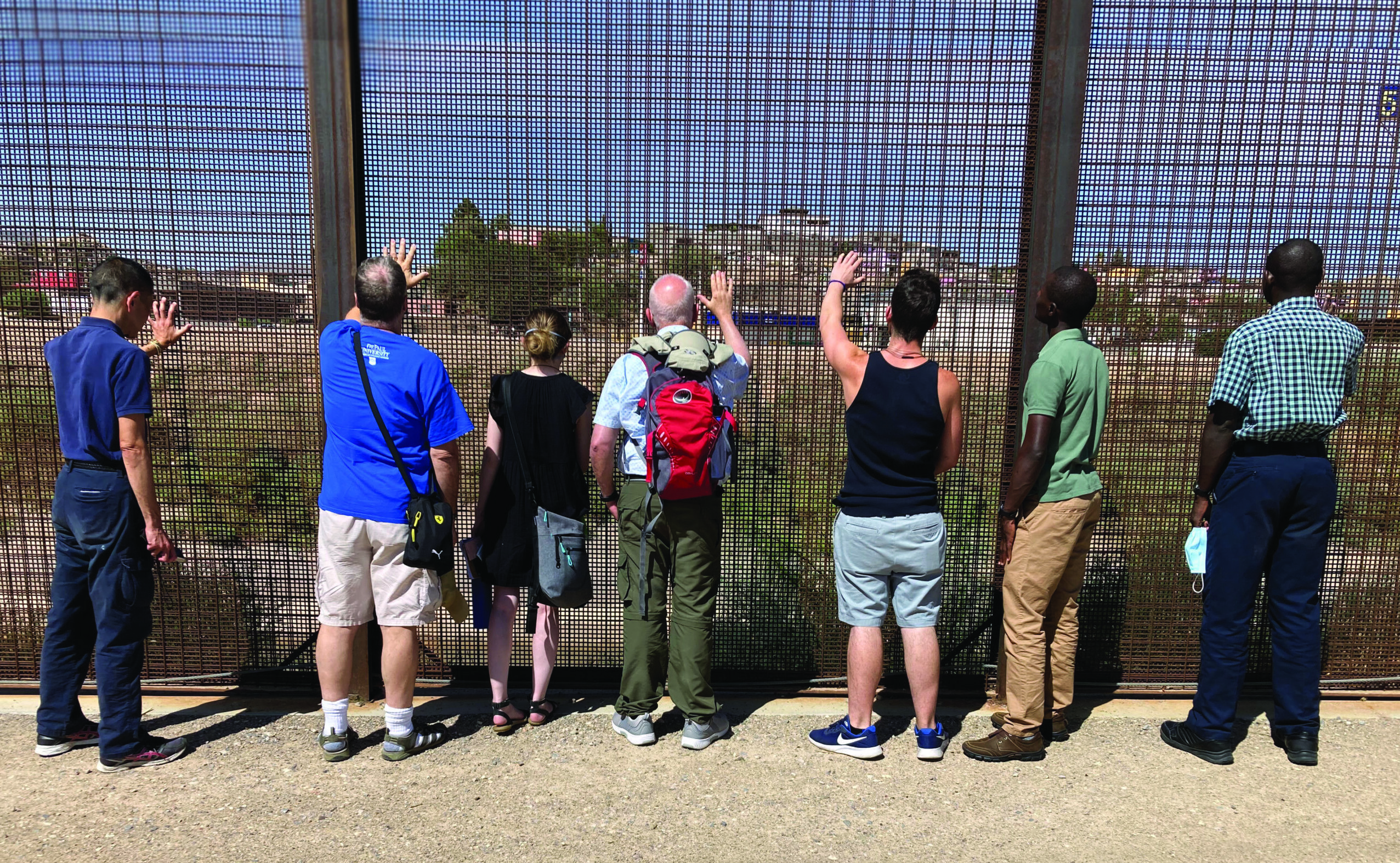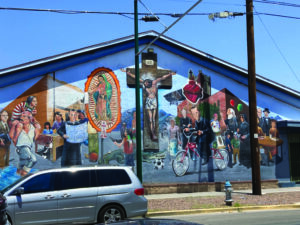
By Fr. David Matz, C.PP.S.
Having celebrated the formation of the United States Province last June at the electoral assembly last June, several of us on the Justice and Peace committee heard a clarion call from Assembly attendees asking why we were not down on the border working with migrants and helping to reform immigration law.
Gabino Zavala, Nancy Clisbee, and I sat down during one of our breaks to create a plan for following through with that call. Part of the plan called for us to visit the border several times during the fall.
In August, I took my first journey: I attended the Encuentro (Encounter) Immersion Experience supported by the Maryknoll priests, brothers, and lay volunteers, in collaboration with the Marist brothers in El Paso, Texas, and Juarez, Mexico. I gathered with nine people from around the United States for this encounter. We lived together and visited refugee centers, community organizing centers, and parishes. We heard many reflections about the diverse and creative ways people are accompanying migrants, refugees, and immigrants locally. Stories from pastors, organizers, Border Patrol officers, historians, religious sisters, and lay volunteers offered us a rounded and complete perspective of the challenges of life on the border.
During our first encounter, a young religious sister, Sr. Krista Fara, who is a third-generation American of Mexican descent, invited us to open our ears and hearts to the stories of the many people who would be entering our lives over the next few days.
She focused our reflection by asking three questions:
- Where are your feet?
- Whose feet are around you?
- How do your feet interact with others
around you?
She spoke of working in a refugee center in Juarez. To get there every day, she crosses a bridge and goes through customs. As she takes each step, she meditates and notices the art on the border of Juarez. This protest art, like graffiti, depicts the “Femicide”—pictures along the path that remember the disappeared women who continue to stand up for unjust practices of U.S. factories in Juarez and the violence inflicted by the drug cartels.
She is frightened with every step. But then she remembers Carlos, a Honduran refugee and a father of a newborn son, who said to her: “¡No se teme, hermana. Recuerdes que Dios es tu compañero! (Don’t be afraid, sister! Remember, God is your companion!) Carlos and his family walked through Guatemala and Mexico, but his faith in God—his companion—was firm. Like Carlos, Sr. Krista is aware of where her feet are and in whose feet she walks. Her feet walk guided daily my feet throughout this week of immersion.

We see so much vilification of migrants, immigrants, and refugees today in politics and in our media. As I write this, Governor Greg Abbott continues to bus large numbers of immigrants out of Texas and into other U.S. cities. Like the 30-foot border wall in El Paso, these busing activities are a political statement he is making with little regard for the human lives affected.
On the other side of the spectrum, I was moved with compassion upon seeing pictures of the mayors of New York, Chicago, and Washington, D.C., welcoming the strangers in their midst. What one state rejects, others welcome. This is our reality in the United States, but it still gives me hope!
One evening during my time in Texas, one of our speakers, a former Border Patrol officer, told us, “You can tell the strength of a country by the way it treats its immigrants!” Pope Francis challenges us to open our hearts to the world. We believe all human beings are our brothers and sisters.
Pope Francis writes we should concretely embody in our responses to our migrating brothers and sisters these four actions:
- Welcome
- Protect
- Promote
- Integrate
We need to journey together to build cities and countries that, while preserving their respective cultural and religious identity, are open to differences and know how to promote them in the spirit of human fraternity (Fratelli Tutti, #129). In Texas, immigrants are vilified by many. During my time in Texas, I learned many Texans choose to journey with the migrants and refugees and to build up communities—not to put these people on buses to make them someone else’s problem. They are our brothers and sisters!
In a typical Precious Blood hospitality moment, one evening our 20 feet found their way to a refugee center. We were asked to plan and prepare a meal for 50 refugees. Thanks to two of us who knew how to cook and delegate kitchen duties, we managed it. We welcomed the refugees, served them, and ate with them.
I sat with a 40-year-old man from Honduras who had just completed an eight-month journey with his wife and family of four. Abandoning his home and his construction business in Honduras, they left to seek a new life for themselves. He was convinced that the existence they knew, disfigured as it is with violence, corruption, or lethal poverty, did not measure up to the promise that is every person’s birthright.
Fernando showed me pictures of his journey to the border, and I began to understand why it took him so long to arrive at Juarez/El Paso. At the road stops along the way, he worked for contractors in the various communities, making money and also helping to create communities of desperately hopeful migrants, each nurturing solidarity as a skill in order to survive as authentic human beings.
I asked Fernando where his wife and children were. He said they were visiting another refugee center where his wife cooks and feeds other refugees. Fernando said: “Through all of this, Padre David, God has never left our sides and will continue to walk with us!” Firmly fixed in faith, he reminded me of the lesson to be aware of my feet, the feet around me, and how my feet interact with others! God walks with us all and never abandons us! Experiencing the strength of Fernando’s faith caused me to confront that my faith pales in comparison to his.
There is so much more that I gained from my immersion at the border.
There is more to come from me as well as the other members of our committee. My feet have not finished walking. Join us on the journey!
